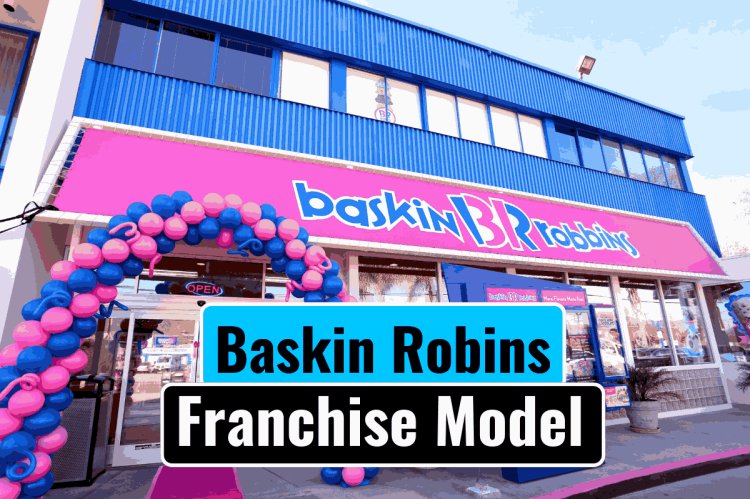Franchise model of Baskin Robins
In the realm of ice cream parlors, Baskin-Robbins stands as an iconic brand known for its wide array of flavors and consistent quality. Central to its global success is the franchise model it operates under. This article delves into the intricacies of Baskin-Robbins’ franchise system, analyzing its structure, benefits, challenges, and the key factors contributing to its enduring popularity.

Introduction:
Baskin-Robbins, with its vibrant array of 31 flavors and a legacy spanning over seven decades, has solidified its position as a household name in the ice cream industry. One of the critical pillars supporting its global presence is the franchise model it employs. This model has not only propelled the brand’s expansion but has also created opportunities for aspiring entrepreneurs .
Understanding the Franchise Model
The franchise model has been an instrumental factor in the success of Baskin-Robbins, as it has allowed the brand to expand its reach across the globe while maintaining consistent quality and customer service. Under the franchise model, franchisees are able to operate under the brand’s umbrella, which provides them with a range of benefits. These benefits include access to Baskin-Robbins’ established business model, brand recognition, operational support, and marketing resources.
Structure of Baskin Robins
Baskin-Robbins offers a range of franchise formats to cater to different markets and preferences. These formats include standalone stores, kiosks, and co-branded locations. This flexibility allows franchisees to adapt to different locations, from busy city centers to quiet suburban neighborhoods, and maximize their customer base.
Benefit
One of the key advantages of franchising with Baskin-Robbins is the brand recognition that it provides. Baskin-Robbins’ brand recognition in the ice cream industry is unmatched, giving franchisees a significant advantage from the start. Additionally, franchisees benefit from a well-established operational framework developed over many years, reducing the risks associated with starting a new business.
Baskin-Robbins also provides extensive marketing assistance to its franchisees, such as national advertising campaigns and localized promotional materials, to help them attract and retain customers. This marketing support is critical, as it allows franchisees to focus on delivering the best possible customer experience while leaving the marketing to the experts. In addition to the above benefits, franchisees also gain access to Baskin-Robbins’ ongoing efforts in developing new flavors and menu offerings, ensuring a continuous supply of innovative products to keep customers interested. This focus on product innovation has been a key factor in Baskin-Robbins’ success, as it has allowed the brand to stay relevant and exciting in a highly competitive industry.
Overall, franchising with Baskin-Robbins provides franchisees with the necessary expertise and knowledge to consistently deliver the distinctive Baskin-Robbins experience. With a proven business model, recognized brand, marketing support, and product innovation, franchisees are well-equipped to succeed in the ice cream industry.
Baskin-Robbins is a well-known ice cream brand that has been operating for more than 75 years. It is a popular franchise opportunity for individuals who want to own their own business and be part of a recognized brand. However, before jumping into this business opportunity, potential franchisees need to take into account several challenges that come with it.
Challenges
One of the primary challenges of acquiring a Baskin-Robbins franchise is the significant initial investment required. This includes franchise fees, equipment expenses, and working capital. The exact cost varies depending on the location, but it can range from a few hundred thousand dollars to over a million dollars. This high initial investment can be a significant barrier for some potential franchisees.
In addition to the initial investment, franchisees are obliged to pay continuous royalties and advertising fees to Baskin-Robbins. These fees directly impact their profitability. The royalties are typically a percentage of the franchisee’s gross sales, while the advertising fees are used to fund national marketing campaigns. Although these fees can help promote the brand, they can also cut into the franchisee’s profits.
Another challenge that franchisees face is upholding Baskin-Robbins’ operational standards and guidelines. Franchisees are required to follow strict guidelines to ensure consistency across all locations while addressing the specific needs of the local market. This includes using specific ingredients, following standard operating procedures, and adhering to the brand’s marketing standards. Failure to comply with these guidelines can result in penalties or even the termination of the franchise agreement.
Lastly, the ice cream industry is fiercely competitive, with both established brands and emerging players vying for a larger market share. To thrive in this landscape, franchisees must find unique ways to set themselves apart from the competition. This can include offering unique flavors, providing exceptional customer service, or creating a welcoming atmosphere in their stores.While acquiring a Baskin-Robbins franchise can be a profitable business opportunity, potential franchisees need to consider the challenges that come with it. These challenges include a significant initial investment, continuous royalties and advertising fees, upholding operational standards and guidelines, and fierce competition. By understanding these challenges, potential franchisees can make an informed decision about whether or not a Baskin-Robbins franchise is the right business opportunity for them.
Factors Contributing to Success:
Despite the challenges, Baskin-Robbins’ franchise model continues to thrive due to several key factors:
Brand Loyalty: Baskin-Robbins has cultivated a loyal customer base worldwide, driven by its innovative flavors, quality products, and memorable experiences.
Global Presence: With thousands of locations spanning over 50 countries, Baskin-Robbins’ widespread presence enhances brand visibility and accessibility, attracting customers wherever they go.
Adaptability: The brand’s willingness to adapt to evolving consumer preferences and market trends ensures its relevance and longevity in an ever-changing industry.
Supportive Community: Baskin-Robbins fosters a supportive franchisee community, facilitating knowledge sharing, collaboration, and collective growth.
Conclusion:
Baskin-Robbins’ franchise model serves as a blueprint for success in the competitive ice cream industry, offering entrepreneurs a compelling opportunity to leverage a beloved brand with a proven track record. By balancing the benefits of franchising with the inherent challenges, aspiring franchisees can embark on a journey toward sweet success with Baskin-Robbins.












